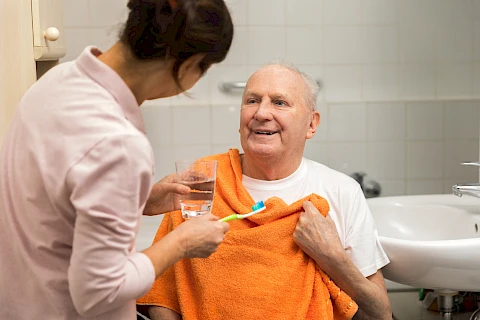
Parkinson's disease is a progressive neurological disorder that affects movement, muscle control, and balance. As the disease advances, it can pose significant challenges to maintaining good oral health. Seniors with Parkinson's may encounter difficulties with routine tasks like brushing and flossing, making it crucial for caregivers to understand how to assist effectively.
Parkinson’s and Oral Health Challenges
Seniors with Parkinson's face unique dental challenges. Common issues include an increased risk of tooth decay and gum disease due to difficulties in maintaining oral hygiene. Parkinson's symptoms, such as tremors, muscle rigidity, and reduced dexterity, can make brushing and flossing challenging.
Medications for Parkinson's often lead to dry mouth, which exacerbates dental health problems. Regular dental visits are vital to catch issues early, as prompt detection of dental problems can prevent more serious complications.
Daily Oral Hygiene Practices
Assisting senior loved ones with Parkinson’s maintain good oral hygiene starts with adapting routines to their physical limitations. The following tips can make daily dental hygiene more manageable and effective:
- Provide seniors with a soft-bristled electric toothbrush to make brushing easier and more effective.
- Guide the senior's hand or gently perform brushing for them if dexterity is an issue.
- Use fluoride toothpaste to combat tooth decay.
- Floss with specialized floss holders or water flossers if manual flossing is too difficult.
Electric toothbrushes with larger handles are ideal for those with limited dexterity. Encouraging a comfortable routine can ensure oral care becomes a consistent part of daily life. Playing calming music can also create a soothing environment.
Managing Dry Mouth and Other Symptoms
Dry mouth is a common issue for people with Parkinson's, largely due to medication side effects. It can lead to discomfort and an increased risk of cavities. Ensure regular hydration throughout the day using saliva substitutes or mouthwashes designed to combat dry mouth. Chewing sugar-free gum can also stimulate saliva production. Some people with Parkinson's may also experience difficulty swallowing. It is best to consult a healthcare provider for strategies tailored to these individual symptoms.
Nutrition and Its Impact on Oral Health
A balanced diet is integral to oral health. Ensure seniors consume a variety of nutrients to support dental and overall health. Encourage foods rich in calcium and vitamins, such as leafy greens, dairy products, and lean proteins.
Limit their consumption of foods high in sugar and acid, as these can contribute to tooth decay. Preparing easy-to-eat meals, such as soft vegetables, mashed fruits, and well-cooked grains, can make mealtimes more enjoyable and nutritious for seniors with limited chewing ability.
Professional Dental Care
Regular dental check-ups are essential for maintaining oral health in people with Parkinson's. Ensure you discuss any specific needs or symptoms the senior may have due to Parkinson's. Before dental appointments, prepare a list of current medications and any ongoing oral health issues. Arrive early to allow the senior to acclimate to the dental office environment, reducing anxiety and stress.
Senior Helpers San Diego North Provides Care for Seniors With Parkinson's
Maintaining good oral health is a vital aspect of caring for seniors with Parkinson's. If you’re seeking more support and resources in caring for a senior loved one with Parkinson’s, we can help. Senior Helpers San Diego North offers compassionate senior home care solutions, including specialized Parkinson’s care. If you’re in Carlsbad, Escondido, Oceanside, San Diego, or Vista, contact us today to learn more about how we can help you navigate the challenges of Parkinson’s care.